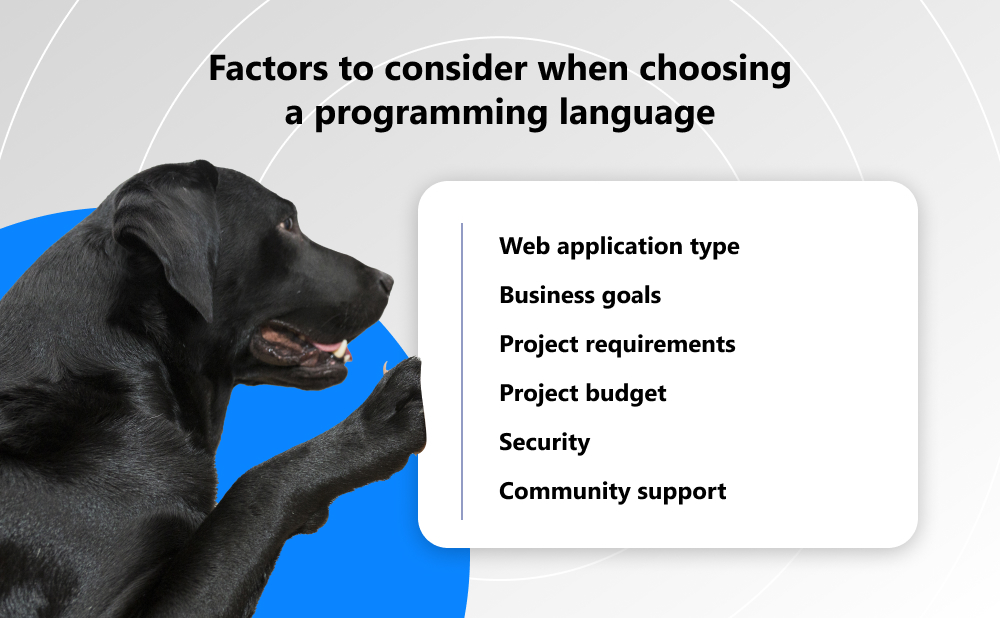What is the best server-side language? If you are a startup or software development company that plans to launch a project, you'll definitely ask this question when choosing a programming language. In our article, we'll talk about the most popular languages for backend web development and explore their strengths and weaknesses to help you decide which one is right for you.
So, what are the most used backend development languages? Let's ask 70,000 programmers who participated in the Stack Overflow Developer Survey in May 2022. According to the report, most backend developers prefer to work with Java, C#, PHP, Python, and Node.js.
written by:
Olga Shimko
Senior Software Developer
What is the best server-side language? If you are a startup or software development company that plans to launch a project, you'll definitely ask this question when choosing a programming language. In our article, we'll talk about the most popular languages for backend web development and explore their strengths and weaknesses to help you decide which one is right for you. So, what are the most used backend development languages? Let's ask 70,000 programmers who participated in the Stack Overflow Developer Survey in May 2022. According to the report, most backend developers prefer to work with Java, C#, PHP, Python, and Node.js.
Contents
Server-Side Programming Languages: A General Overview
First of all, you need to understand what server-side scripting languages are. The programming languages are usually divided into 2 groups: client-side and server-side. As the name suggests, programs created in client-side languages are processed on the user side and, as a rule, executed by the browser.
When a user requests a web page (follows a link or enters URL into the address bar of the browser), the web page is initially processed on the server (i.e. all programs associated with the web page are executed) and then returns to the visitor through the networks as a file. The file can have the following extensions: HTML, PHP, ASP, Perl, SSI, XML, DHTML, and XHTML. Scripts that perform these actions are written in server-side programming languages that interact with database management systems.
The frontend code is primarily used to improve the design and behavior of the web page. Frontend developers are responsible for selecting and styling UI components, creating layouts, navigation, form validation, and so on. Server-side website programming involves selecting content that is returned to the browser in response to requests. Server-side code handles tasks like validating submitted data and requests, using databases to store and retrieve data, as well as sending the correct data to the client as needed.
Your project cannot do without backend development. Server-side programming is used by retailers to build research results for products, generate a targeted offer based on customer preferences and previous purchases, simplify orders, etc. Banks use server-side programming to store accounting information and allow only authorized users to view and complete transactions. Other services, such as Facebook, Twitter, Instagram, and Wikipedia use backend development to distribute and control access to interesting content. Thus, you just need to choose a server-side language to create your web application or website.
Best Programming Languages: What Are They?
As above-mentioned, our top 5 most popular server-side programming languages are Java, C#, PHP, Python, and Node.js. Let's take a closer look at them.
Java
Java was first released in 1995 by Sun Microservices. Over time, it has grown into a powerful general-purpose language that can move with astonishing ease from one computer system to another. Thus, it doesn’t come as a surprise that today it is in the top 10 of the most commonly used programming languages in the world (it ranks 6th). According to the Stack Overflow Developer Survey 2022, 33.27% of developers actively use it. The latest version of Java is Java 19, it was released in September 2022.
Currently, Java is not just a universal language. It's a whole platform and ecosystem that combines various technologies used for a variety of tasks from creating desktop applications to building large web portals and services. In addition, Java is actively used to develop software for many devices, including PCs, tablets, smartphones, household appliances, and much more.
Advantages
Scalable and simple
If you plan to create scalable applications, Java is a great choice. It will allow the server to run multiple instances of applications simultaneously. Thanks to the object-oriented approach, you will be able to build large, flexible, scalable, and extensible web applications.
Multithreading
It is capable of handling requests in independent threads on a multithreaded WEB server. This is why this programming language works great with applications that require enormous processor power.
Open-source code
Thanks to the open-source code, a huge community has formed around Java. They created a great number of free libraries and frameworks. Using these tools considerably speeds up the server-side development process.
Enhanced security
Java provides many features that mitigate security risks. For example, Java Virtual Machine checks Java bytecodes to keep viruses from spreading. The Java security model and reusable code testing enhance security as well.
Disadvantages
- If you are going to take Java for commercial use, you must have a license.
- Java is slow in performance because of the usage of a computer virtual machine for compilation, memory cleanup problems, thread blocking, poor caching settings, etc.
- Developers have to use third-party libraries and tools to create a native design.
- It has complex and verbose code.
In spite of some drawbacks, Java has many benefits that make it a popular language among many large companies, such as Airbnb, Uber, Pinterest, LinkedIn, Groupon, eBay, Evernote, FitBit, Hubspot, and so on.
C#
C# is a general-purpose high-level programming language developed by Microsoft Corporation and released in 2001. C# is platform-independent due to its compilation to an intermediate language (IL) which can then be executed on any platform supporting the Common Language Infrastructure (CLI). C# is one of the primary languages for developing applications within the .NET Framework. C# shares similarities in syntax with both C++ and Java.
While the exact number of programmers who appreciate C# may vary ranging from 8 to 12 mln, it is widely acknowledged that C# provides benefits of languages like C++ with additional features and ease of use, reducing the likelihood of certain types of errors
C# is continuously being updated with new features and improvements with each new version, and the mentioned features like lambdas, dynamic binding, and asynchronous methods have indeed been introduced in newer versions of C#.
Advantages
Huge Microsoft support
Microsoft is working hard to develop this programming language. For example, the company bought Xamarin, released the .NET platform, and continues to invest in Azure to make C# compatible not only with the company's technologies but also with open standards. Xamarin is a framework that enables developers to build apps for Android and iOS. This is undoubtedly a great preference as Windows Phone, Microsoft's mobile operating system, didn't gain much popularity.
Lots of syntactic sugar
Syntactic sugar is constructs that are designed to make code easier to write and understand (especially if it is another programmer's code) and do not play a role during the compilation.
Easy-to-learn
If a developer knows C, C++, or Java, he or she won't have problems learning C#. Therefore, a large pool of C# programmers will always be available to you.
Disadvantages
- It's focused on the Windows platform.
- There is no support of multiple inheritance in C#. For example, if you want to implement a complex class hierarchy in C++ into C# you have to redesign the way your code operates.
- C# is free only for small firms, individual programmers, startups, and students. A large company will have to buy a license to use this programming language.
The C# toolkit allows you to solve a wide range of tasks as the language is very powerful and versatile. It is often used to develop web applications, games, mobile applications for Android or iOS, as well as programs for Windows.
PHP
PHP was created in 1995 and since then has continued to take high positions in various rankings. More than 80% of all websites are written in this programming language, according to WWW Technology Surveys. Giants like Wikipedia, Slack, WordPress, Tumblr, Nvidia, Pinterest, and Facebook use it.
Both startups and large companies develop products in PHP as it has a wide range of functions. For example, the language is used for data collection, server-side scripting, dynamic content generation, and much more. It is compatible with almost all operating systems, including Microsoft Windows, Linux, macOS, and most versions of UNIX. It's also supported by most servers and databases.
Advantages
Open-source code and versatility
There are many free PHP libraries that accelerate web development. They allow programmers to use functionality that has already been implemented and tested, instead of wasting time writing their own code.
Continuous updating
New versions of PHP are released on a regular basis in order to improve performance and add new features.
Ease of use
Like C#, PHP is similar to C, which makes it the perfect language for newcomers. The more developers know it, the more chances that you will never run out of the required specialist.
Automation of functions
PHP's scripting feature makes it suitable for creating automation like authentication, URL mapping, session management, and more.
Built-in security
PHP has many built-in security features that can mitigate a large number of vulnerabilities. For instance, you can use strip_tags functions to remove HTML, JavaScript, or PHP tags from a string and protect your app from cross site scripting. Also you can apply the filter_var function for data validation and sanitization to remove illegal characters from a string.
Disadvantages
- PHP can't effectively compete with modern development technologies, such as Python or Ruby due to the limited number of libraries.
- It's dynamically typed, and the same piece of code can behave differently depending on the context, making PHP programs difficult to scale and sometimes slow.
- PHP is not suitable for writing desktop and mobile applications.
It is ideal for creating websites and web applications of any complexity. You can use PHP to create blogs, online stores, landing pages, APIs, console scripts, and other web services.
Python
Python was created by Dutch developer Guido Van Rossum in 1991. Since then, it has become a very popular programming language that is alive so far. SlashData revealed that there are more than 8 million Python developers in the world. It is a simple and lightweight language that supports object-oriented, functional, and aspect-oriented programming. What's more, it's a dynamically typed open-source language.
Python is widely used for web development, building desktop applications, working with databases, and developing AI and ML-based products. It boasts a very large community that created many useful materials and libraries.
Advantages
Open-source code
Python is a free and open-source platform that offers many available tools and resources that make the application development process cheaper, better, and faster.
Huge amount of available resources
Python is supported by a huge number of libraries, enabling programmers to write less code by hand. Some libraries contain code that improves tasks, such as emailing, web browsing, working with databases, unit testing, and others.
Insertion codes
The Write Once Run Anywhere rule allows developers to embed Python code in the source code of other languages, such as C++.
Disadvantages
- Python code execution becomes slow if it is interrupted. This pitfall slows the entire project.
- The Python database access layer is less advanced compared to other backend programming languages.
- Extensive testing is required to find bugs in Python codes.
- It relies heavily on third-party frameworks and libraries.
Python is used by the following well-known companies: Spotify, Pandora, Netflix, Mozilla, Uber, Pinterest, Quora, Asana, and others.
Node.js
Please recall that Node.js is not a programming language. It's a programming environment based on the Google Chrome V8 engine that allows developers to use JavaScript as a server-side language. Node.js appeared in 2009 and has already won the hearts of programmers. It is widely used to develop ad services, gaming platforms, forums, content management systems, P2P marketplaces, and e-commerce platforms.
Advantages
High performance
Thanks to Google V8, Node.js can be used to develop chatbots and similar real-time applications.
Full-stack development
You can hire only one JavaScript team to build the entire application, which significantly reduces the project development costs and speeds up the development process.
High scalability
High scalability and lightness make Node.js a great choice if you plan to split your application into microservices in the future. Microservice architecture means breaking your application into isolated and independent services, making it easier to update and maintain the architecture because your services are separate from each other. You can add new or fix existing architecture without working with other parts of the application.
Open-source code
A number of companies, including IBM, Microsoft, PayPal, and Fidelity, established the Node.js foundation in 2015. They contribute to the development of basic tools for the programming platform. Many developers create solutions and guides to solve any Node-related problems. This means that your programmers can always find the answer to any question.
Disadvantages
- Node.js requires a clean architecture. It's an event-driven environment; therefore, it can run several events simultaneously only if the relationship between them is well written.
- A heavy computational request blocks the processing of other tasks and slows down the application written in Node.js. Thus, it's not suitable for projects based on data science.
- It lacks core libraries and tools, which makes it difficult for developers to choose the best option.
Well-known Node.js users include LinkedIn, Trello, eBay, Walmart, PayPal, and more.
How to Choose the Best Server-Side Language?
In technical terms, you can take any programming language for most projects. All of them will help you successfully implement almost any functionality of your website or application. Speaking from an economic point of view, there is a difference.
For example, time-tested programming languages have large communities and a huge amount of documentation and tools. Consequently, you will easily find the required programmers for your project. According to Glassdoor Economic Research, it takes you only 12.5 days to hire a Java developer. If the language is relatively young, you may find it difficult to pick up a professional with the necessary skills quickly.
What other factors should you take into account when choosing a programming language for backend development?
Open-source code
Using free programming languages will speed up and cheapen the development process of your project since your programmers will be able to reuse third-party code without having to create it from scratch. They will have access to various free frameworks and libraries as well.
Scalability
If you are a startup looking to grow into a large company over time, you need to choose a flexible language that allows you to scale your business.
Performance
The performance of your product directly depends on the programming language speed.
In general, there is no perfect programming language that will lead your project to success. Every language has its own strengths and weaknesses that can be used to the best advantage. It all depends on your requirements and business goals. If your project needs speed, select a lower-level language. If you are on a tight budget, choose a popular language to hire a low-cost development team. If you are working in a platform-independent way, use a platform-independent programming language.
If you are still thinking about the best programming languages for your project, our specialists will be happy to help you. For more detail, please visit our website or get in touch with our support team.

Contacts
Feel free to get in touch with us! Use this contact form for an ASAP response.
Call us at +44 151 528 8015
E-mail us at request@qulix.com












